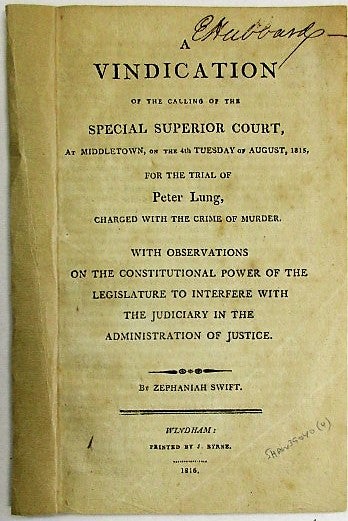
A VINDICATION OF THE CALLING OF THE SPECIAL SUPERIOR COURT, AT MIDDLETOWN, ON THE 4TH TUESDAY OF AUGUST, 1815, FOR THE TRIAL OF PETER LUNG, CHARGED WITH THE CRIME OF MURDER. WITH OBSERVATIONS ON THE CONSTITUTIONAL POWER OF THE LEGISLATURE TO INTERFERE WITH THE JUDICIARY IN THE ADMINISTRATION OF JUSTICE.
Windham [CT]: Printed by J. Byrne, 1816. 48pp. Bound in modern marbled wrappers. Light toning, Very Good. Ownership signature, "E. Hubbard's".
"Lung, while drunk, beat his wife to death in bed. He was twice tried and convicted" [McDade 637]. Swift, as Chief Judge of the Connecticut Superior Court, originally ordered Lung tried before "a special Superior Court" after a Jury of Inquest found that Mrs. Lung was the victim of a wilful murder. Swift did so, he says, because the regular session of the Superior Court had closed, and the remaining sitting judges were in ill health. Lung was convicted and sentenced to death.
The legislature, upon Lung's petition, decided that Swift lacked the power to call such a court or "to issue a warrant to summon a grand jury." Ordering that Lung be tried again in the ordinary course of judicial business, the legislature concluded that Swift had attempted "an illegal exercise of power, so flagrant as to require to be resisted by legislative interference." Swift reminds his readers that when his "court assembled, there was not the remotest hint that it was not duly organized." The evidence and court proceedings, set forth here, were carefully and meticulously presented, all demonstrating the certainty of Lung's guilt. "No man ever had a fairer and more impartial trial than Lung." Swift gives the legislature a lesson in the constitutional separation of powers, arguing that the General Assembly has no power to perform judicial functions, as it sought to do in Lung's case.
"Judge Swift sometimes generated controversy as in Lung's Case, 1 Conn. 428 (1815). Peter Lung was convicted of murder and sentenced to death, with Swift as one of the three presiding judges. Lung appealed to the State Legislature and, citing irregularities in the grand jury proceedings, the Assembly ordered a new trial. Judge Swift published a pamphlet criticizing the action stating in part, '...the legislature should never encroach on the judiciary'." [website of the CT Judicial branch, www.jud.ct.gov/lawlib/history/swift].
McDade 638. II Harv. Law Cat. 699. AI 39040 [4]. Item #34581
Price: $875.00

